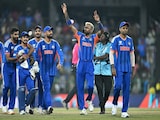The huge salvo of missiles and drones launched from the arid plains of Iran toward Israel was the kind of direct conflict between the Middle East powers that the world had long feared would mark the explosion of a full-blown regional war.
But behind the unprecedented nature of the attack was a dance of diplomatic signalling that allowed both sides to claim success, raising the risk of a broader conflict without making it a certainty.
The Israeli military said 99% of the barrage was shot down and no Israelis were killed after Iran had signalled for days it was coming. Tehran said it had made its point, seeking to put the march toward a wider conflagration on hold. Israel's backers in the US and Europe were also pressing to avoid any further escalation in calls on Sunday.
For all the steps toward the brink, since Hamas attacked Israel on Oct. 7, the Jewish state and its enemies have managed to stop short of the precipice, even as violence has spread to other countries in the Middle East.
What changed over the weekend is that the latest US-led diplomatic efforts - until now focused on deescalating the crisis in Gaza - are being targeted at ensuring any response from Israel is measured, according to people familiar with the discussions.
US officials, speaking on condition of anonymity, said while the attack was meant to be deadly and destructive, Washington is urging Israel against retaliation. The concern, though, is that logic might not prevail, according to a person familiar with the discussions. Indeed, one wildcard is the pressure on Israeli Prime Minister Benjamin Netanyahu from hardliners in his government, though the success in defeating the Iranian strike may strengthen his hand.
The attack by Iran was "very calibrated" to limit the damage, said Sanam Vakil, director of the Middle East & North Africa Program at Chatham House. Still, she said, "we're closer than ever to a broader regional war."
Iran's latest assault was a dramatic escalation, with the hardline government striking directly for the first time after decades of relying on proxies like Hamas and Hezbollah to fight a shadow war with its main regional rival.
It showed with the massive barrage that it was ready to challenge Israel's superior military head-on, something no other power had dared to do for decades. The US moved ships and planes into position and vowed to help protect Israel. The UK and Jordan were also involved.
Oil markets steadied on Monday after Israel repulsed the attack but the prospect of $100 for a barrel of oil is now looming again, while Bloomberg Economics predicts a direct war between Israel and Iran would thrust the world economy into recession.
But Iran, seeking to avoid a spiralling conflict with Israel's superior military, preceded the operation with days of public and private warnings. Its officials described its intent to retaliate to countries in the region, according to a person with knowledge of the briefings, a move which enabled this message to reach the US indirectly. American officials said there was no direct warning to the US.
Though the damage was limited, Iranian officials touted the operation as a successful retaliation for an April 1 attack on a diplomatic compound in Damascus that killed several of Iran's military commanders. Iran blamed that hit on Israel, whose government hasn't taken responsibility.
On Sunday, Israel was also celebrating having defeated the onslaught, able to demonstrate again the country's military prowess in downing the missiles and protecting its citizens following criticism in the wake of the Hamas attack six months ago.
For Netanyahu, there's also a renewed demonstration of support from the US and its allies after months of escalating public criticism of Israel's deadly military operation in Gaza, including from President Joe Biden. Congressional leaders are planning a long-delayed vote on additional aid for this week.
US officials who had warned in the days before the attack that the situation was extremely dangerous were relieved the defences had worked and damage hadn't been worse. They called on Israel in public and in private to resist the desire to retaliate against Iran, or at least to keep whatever response there is limited enough to prevent raising the stakes further.
Israel made clear to the US on Sunday it's not looking for a significant escalation with Iran, according to US officials. They're looking to protect themselves and defend themselves, one official said.
"Remember, these are two parties that have a very long history with one another," said Michael Singh, a former top White House official who is now managing director at the Washington Institute for Near East Policy. "Neither would like to see this erupt into a full-scale war. Does that mean a miscalculation can't happen? Absolutely not."
Calls in Israel for another round of retaliation, this time directly against Iran, added to the fears. National Security Minister Itamar Ben Gvir demanded a "crushing attack." While Netanyahu didn't endorse that appeal, Israel's war is still far from over.
Many in Israel aren't clamouring for a quick flex of the muscle, partly because Iran's attack was so unsuccessful. In the meantime, it's distracted global attention away from the brutal war in Gaza.
That conflict has already seen some 33,000 Palestinians killed, according to Hamas, considered a terrorist organization by the US and European Union. More than 100 hostages have yet to be freed and thousands of the militant group's fighters are still entrenched in Rafah, a city in Gaza where hundreds of thousands of refugees are sheltering.
Hamas rejected the latest cease-fire proposal from mediators following Iran's assault, according to Mossad, the Israeli external intelligence agency.
Israeli forces are planning an assault on Rafah, while violence also looms on Israel's northern border, where tens of thousands of civilians have been evacuated on both sides amid fighting between Israel and Hezbollah.
For the moment, the weekend attack seemed to signal that the deterrence that's kept Iran from widening the war into a full-on battle with Israel still holds.
Iran is trying to draw a "new line," according to Dana Stroul, who until December was the Pentagon's deputy assistant secretary for the Middle East.
"If Israel targets any of its officials abroad, even when those officials are engaged in terrorist activities, Iran will respond with attacks like we saw last night," she said. Israeli leaders "will need to respond," but in a way that will "prevent opening a new escalatory cycle that tips into full-scale regional war," she said.
Last week, even as Tehran was publicly threatening massive retaliation, it was telling Arab countries in the Persian Gulf that the response would be measured and steer clear of their territory. The Houthis, Iran's proxies in Yemen who've been attacking ships in the Red Sea, would have a limited role, they said.
One diplomat in the region said Tehran appeared to discuss its intent to retaliate with nearby countries in order to demonstrate restraint behind the public shock and awe it aimed to deliver after the killings of its commanders at the embassy compound in Syria, which formally qualifies as Iranian territory. The Gulf countries, desperate to avoid a wider war, underlined the importance of caution.
Israel matched Iran's public threats with warnings of its own, backed up by public pledges of support from its allies.
On Friday, while officials were saying the attack was imminent, the US dispatched a top military commander to Israel to help coordinate the response. American and British planes and warships helped down some of the drones.
Though potentially devastating, the assault appeared designed more to demonstrate resolve than to overcome Israel's defences, said one Western diplomat.
Still, officials in the region said they expect some kind of response by Israel, given the unprecedented nature of Iran's direct attack. Just how severe it is will show whether the march toward the brink of broader conflict is in fact on hold.
The lack of damage and casualties means that the Israelis could limit their strike, said Mark Cancian, a defence analyst with the Center for Strategic and International Studies in Washington. "Maybe they will attack a military base that launched the missiles, maybe a production factory, maybe Iranian naval assets," he said. "Everyone is watching to see what the Israelis will do."
(Except for the headline, this story has not been edited by NDTV staff and is published from a syndicated feed.)















